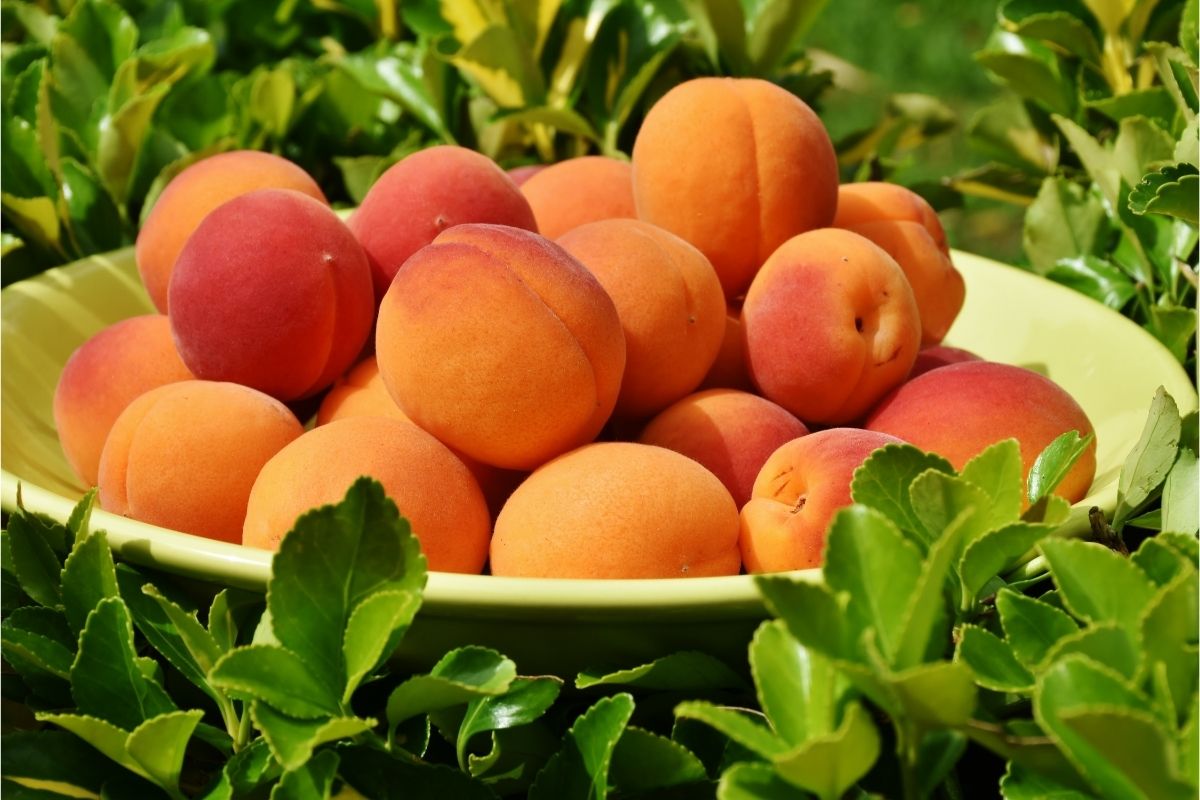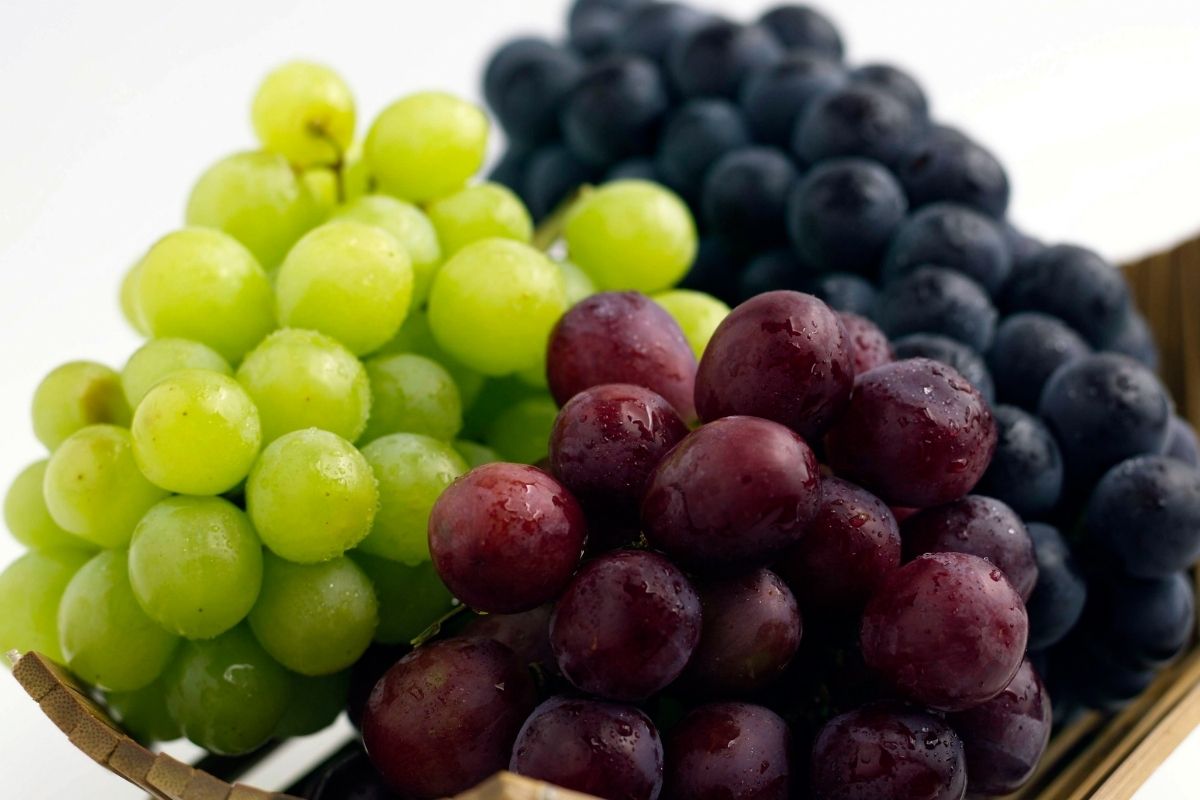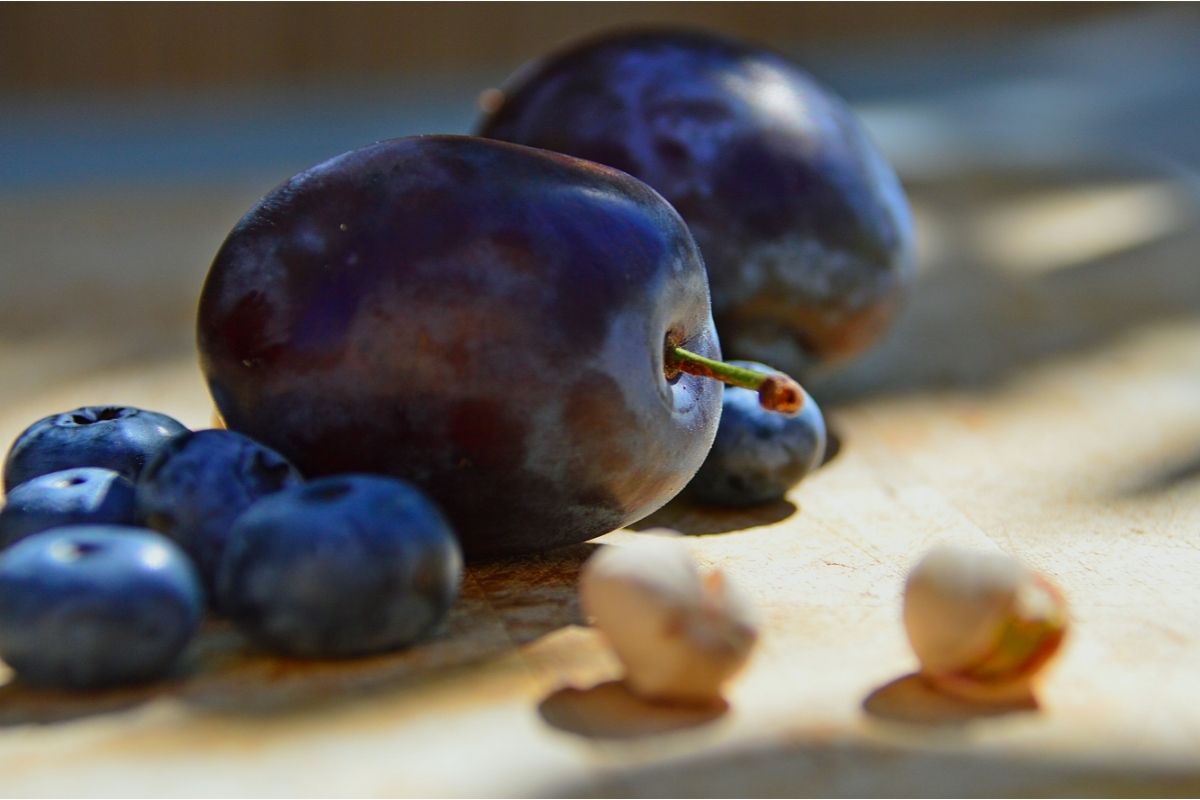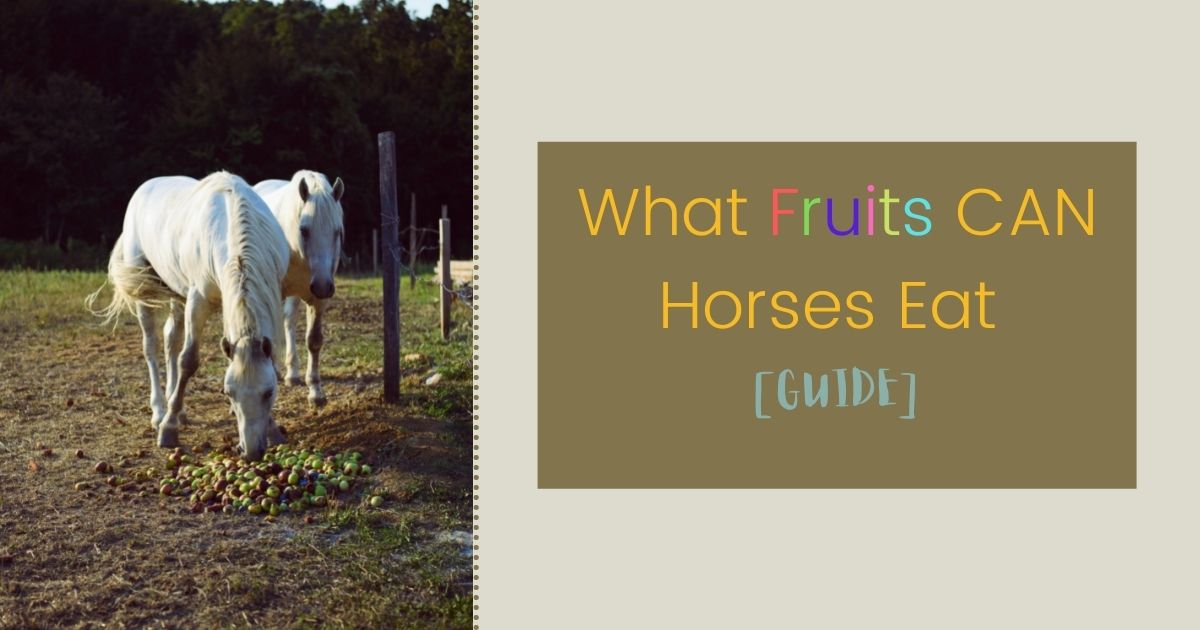Safely Feeding Fruits to Your Horses
Apples are a healthy treat for horses, and a bonus is that horses completely love them! But, apart from apples, what fruits can horses eat? Have you ever wondered what other fruits can serve as tasty and nutritious treats for your horses?
Can horses eat grapes, raisins, bananas, or pears? The answer is Yes! Let’s go through a list of what fruits your horses can eat and what fruits are bad for them.
How Much Fruit is TOO Much for Equines?
Giving too much food to your horse can be harmful, and fruits are no different. However, fruits are natural and quite different in constitution compared to processed foods, so it is pretty easy to mistakenly assume it’s suitable for horses, especially in excess.
Horses will never say no to treats, and they will eat what is given to them. Therefore, it is your responsibility to understand how sensitive their digestive system is and feed them fruits in moderation. Excessively feeding your horse too many fruits can lead to obesity, colic, laminitis, and other serious health complications.
However, this doesn’t mean you shouldn’t feed your horse treats at all. You can do so, but in moderation, you can feed them fruits once every few days and not a ton of fruit in one go.
What Fruits Can Horses Eat Apples?
The answer to the question “can horses eat apples?” is a resounding yes! Horses love apples, and apart from the fact that they are tasty and juicy, apples are also highly nutritious. Apples contain dietary fiber, minerals, and vitamins that are highly beneficial to your horses.
Apples help reduce the risk of obesity, improve digestion, and help prevent heart problems. An apple a day truly keeps the doctor away but remember to feed them to your horses in moderation.
Apricots
Apricots are high in vitamins A, C, and E and antioxidants, making them an ideal fruit to feed your horse. Its nutritional value helps protect your horse from many diseases and bacterial infections. Also, like apples for horses, apricots offer plenty of good dietary fiber, which helps keep your horses’ digestive system in good shape.
In terms of taste, horses love them, so it’s a win-win situation. However, when feeding an apricot to your horse, be sure to take out the stone to prevent choking or gastric problems.

Bananas
Can horses eat bananas? Yes, bananas are great for horses. They are perfect for giving your horse a boost of energy. In addition, bananas are an excellent source of potassium, and they have many health benefits.
They help repair cell and tissue damage, prevent gastric issues such as ulcers, and aid indigestion. Feeding your horse a whole banana (including the peel) helps keep your horse in good shape.
Blueberries
Can horses eat blueberries? Blueberries are a delicious and healthy treat for horses. They contain essential nutrients like manganese, copper, iron, and vitamins. In addition, they can help digestion, prevent inflammation, and improve your horse’s blood sugar and insulin response.
Most horses enjoy blueberries, so you can keep a few in your pocket so you can reward your horse for good behavior.
Cherries
Cherries are packed with natural goodness; they are rich in vitamin C and contain antioxidants and anti-inflammatory compounds. They also contain calcium which can help keep your horse’s bones and hooves strong.
You can feed your horse cherries at any time; however, the ideal time to feed them cherries should be after exercise since that can help their recovery. Make sure to remove the pips first.
Figs
Figs are a rich source of vitamins and minerals such as potassium, calcium, iron, and vitamin A, which will keep your horse healthy. They are sweet, juicy, and contain dietary fiber as well. Figs have a high sugar content and can be a better alternative to sugar cubes.
An additional benefit is that they are sweet, so your horses will love them! Finally, you can feed them to your horses, either fresh or dried.
Grapes
Can horses eat grapes? Grapes are an excellent treat for horses. They have fantastic nutritional values as well. Grapes contain both prebiotics and probiotics, which means they have anti-inflammatory, antibacterial, antioxidant, and even anti-cancer properties.
This is good news for your horse since feeding them these bite-sized treats will go a long way to ensure their general health and well-being.

Kiwi
Kiwis, also known as Chinese gooseberries, are the perfect treat for your horses. Though small in size, they contain more vitamin C than lemons, potassium, and omega 3 to keep your horse healthy. They are also suitable for horses with ulcers and other gastrointestinal issues.
Kiwis are known to contain actinidin, an enzyme that helps with the breakdown of proteins and proper digestion. Therefore, you can feed the whole fruit to your horse, including the peel (wash thoroughly to eliminate any contaminants).
Mango
Mangoes are a tasty and sweet treat for your equine friend. Even though they are relatively high in sugar, they are perfectly good for horses to eat. However, they should only be given an occasional treat to horses due to their sugar content.
Before feeding mangos to your horse, remove the peel and the pip because they contain toxins. Mangoes are also a good source of fiber and antioxidants, including vitamin C, which means they support a healthy immune system.
Melons
Melons contain a host of minerals and vitamins that will help keep your horse healthy. They generally have low sugar and high-water content, which is especially good in the summer for helping cool your horse down. Melons make an excellent treat for horses. As long as you remove the seeds from the melons and clean them properly, you can also feed the rind to your horse.
Nectarines
Nectarines have a higher fiber content compared to other fruits. Though they are low in sugar, their high fiber content makes them an ideal treat for horses. In addition, nectarines contain beta-carotene, a mineral the body needs to create vitamin A.
Vitamin A boosts the immune system’s effectiveness and keeps your horse’s eyes and skin healthy. In addition, nectarines contain pits; therefore, horses can safely eat them as long as you remove the pits first.
Oranges
Can horses eat oranges? Oranges have the same amount of sugar as many melons but have fewer calories and a lot more vitamin C. Oranges are perfectly okay for horses to eat as treats since they can also help boost your horse’s energy levels.
Recent studies found that giving horses orange peels after exercise reduced tiredness, so you could always use an orange segment as a healthier option when exercising your horse.
Peaches
Can horses eat peaches? Yes! A lot of people mistakenly think peaches are just hairy or furry nectarines. Though these fruits are genetically similar, peaches contain less sugar and calories than nectarines. In addition, peaches have high vitamin A and C levels and are a good source of omega 3 and potassium.
Peaches also contain a lot of beta-carotene and have the same health benefits as nectarines. With this in mind, periodically feeding your horses peaches will help improve the health and wellbeing of your horse.
Pears
Can horses eat pears? Yes. Pears are slightly healthier than apples! Pears contain fewer calories than apples but contain less sugar and more dietary fiber than apples. As a result, pears make an excellent treat for apples; they help improve a horse’s digestion and are a healthier alternative to apples.
There are various ways to feed your horses pears. However, the most important thing to remember is to remove the stalk, leaves, and seeds from the pear before feeding it to your horse.
Pineapples
Can horses have pineapples? Pineapples are an excellent source of vitamin C. Pineapples are tasty and can improve your horse’s overall health. A bonus is that horses love them because they are sweet! In addition, pineapples contain bromelain, an enzyme that helps improve your horse’s digestion.
When preparing pineapples for horses, remove the core and the skin. Cut the pineapple into rings, then slice the rings into quarters. Feed your horse small pieces.
Plums
Plums are often classed as superfoods. A superfood refers to foods that give maximum nutritional benefits for minimal calories. They are packed with vitamins, minerals, and antioxidants. Like nectarines and peaches, plums make a delicious, nutritious treat for horses.
Plums help reduce anxiety and stress, relieve constipation, and aid digestion.
They are sweet to the taste, and horses love them. Plums can be frozen and made into cooling frozen treats for horses. Like nectarines and peaches, plums contain pits you must remove before feeding the fruit to your horse.

Strawberries
Can horses eat strawberries? Yes! Strawberries make tasty and healthy treats for horses. They are low in sugar, contain many vitamins, and have low calories. Strawberries are packed with nutrients that will help boost your horse’s immune system. In addition, they are low in fat and sodium.
In warm weather, strawberries come in handy because they contain a lot of water that can help hydrate your horse.
Raisins
Can horses eat raisins? Horses can eat raisins. Horses enjoy raisins as treats because they are sweet, chewy, and offer sufficient sugar. In addition, raisins contain minerals and vitamins like potassium, iron, magnesium, calcium, vitamin B6, and vitamin C in large quantities.
They pose no choking hazards to horses and are safe in small and moderate quantities. However, feeding your horse too many raisins may lead to digestive problems in your horse.
Watermelon
Quite many horses love watermelons. Watermelons are suitable for horses, and their calcium content helps keep your horse’s bones, teeth, and hooves solid and healthy. Watermelons have no cholesterol and are virtually fat-free.
Most importantly, they are good for helping your horse to keep cool when the weather gets really hot. Although you can moderately feed your horse watermelons, make sure to wash the fruit thoroughly before you feed it to them (you can also feed them the rind).
Fruits NOT to Feed Your Horse
Horses have sensitive digestive systems, and the wrong kind of fruit can cause gastrointestinal diseases and other health complications. Excessively feeding your horse even the right type of fruits can also cause health issues. That is why it is necessary to provide your horse with fruits in moderation.
There is often a misconception that horses can eat all kinds of fruits. This usually stems from the fact that horses eat most fruits. However, some fruits are not safe for your horse to eat, and some are mentioned below.
Fruits like rhubarb, persimmons, and other fruits from the nightshade family, like tomatoes, goji berries, and bell peppers, are not given to horses. Avocado is one of the deadliest fruits to horses. Any part of the fruit, be it the meat of the vegetable, the skin, or leaves, can be harmful to horses.
The avocado’s pit can also be a choking hazard. As mentioned before, tomatoes are poisonous to horses. In addition, tomatoes contain atropine which is known to cause colic and other digestive issues.
Unpitted fruits can be a choking hazard, and the stones or seeds often contain toxins such as arsenic and cyanide that can be harmful.
The Final Neigh
The way to a horse’s heart is through food. Horses love treats and will eat almost anything offered to them, even the fruits and treats that are poisonous to them. It is well known that horses have a delicate digestive system, so it is necessary to pay attention to what you feed them and how you feed them.
Fruits are necessary for the growth and wellbeing of horses. This is because they offer many (depending on the fruit) nutrients and minerals. However, excessively feeding your horse fruits will lead to many health complications and adversely affect the animal’s quality of life. Therefore, it is necessary to feed your horses fruits in moderation.
Finally, knowing and identifying which fruits not to feed your horses is key. Feeding your horse the wrong kind of fruit, even in small quantities, can affect the health and well-being of the animal.
Horses are more than just pets; they are companions who need to be cared for and treated with respect. As a result, it is necessary to devote considerable thought to their care, mainly on what they eat.
